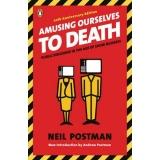- Rating
- Category
- non-fiction
- Read
- 2013-07-24
- Pages
- 184
Everyone needs to read this. A nuanced yet hard hitting critique of television culture. Investigates the medium, and the types of messages it can convey, and how it has transformed public discourse. Hard to believe how relevant this is despite being 25 years old.
“The problem is not that television presents us with entertaining subject matter but that all subject matter is presented as entertaining, which is another issue altogether.”
On trivia: “A pseudo-context is a structure invented to give fragmented and irrelevant information a seeming use.”
On tele-evangelists: “The spectacle we find in true religions has as its purpose enchantment, not entertainment. The distinction is critical. By endowing things with magic, enchantment is the means through which we may gain access to sacredness. Entertainment is the means through which we distance ourselves from it.” … “It is well understood at the National Council that the danger is not that religion has become the content of television shows but that television shows may become the content of religion.”
One conclusion (don’t have exact quote handy) was along the lines of: entertainment programs are fine, it’s the “news” and “serious” TV that are problematic. We need TV to get worse, not better.
